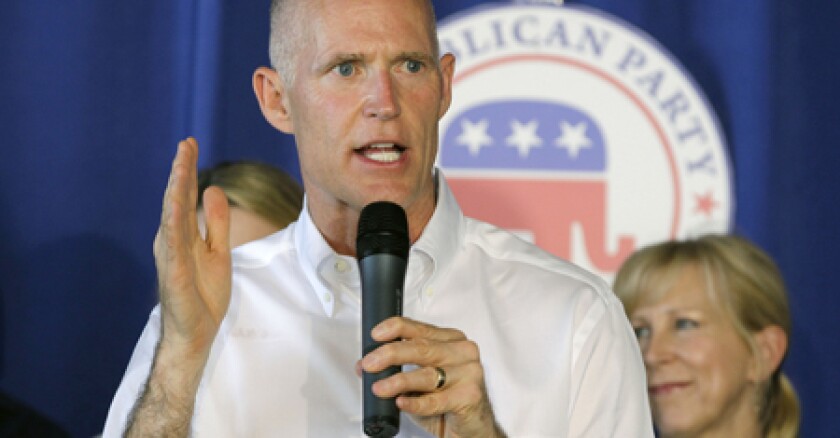Technically, states have until Nov. 16 to submit their exchange blueprint to the U.S. Department of Health and Human Services (HHS). They can choose to have either a state-run exchange, a federal-run exchange or a state-federal partnership exchange. States can also access hundreds of millions of dollars to plan for any of those models; HHS has already awarded more than $1 billion in grants.
So in the wake of Obama's reelection, the last chance for the law's opponents to stop its implementation, local media started pressing governors to explain what they were going to do. It's unsurprising that many, particularly Republicans, are saying they'll have a federal exchange. Not only are they philosophically opposed to the law, but if they haven't done any planning for a state-run or a partnership exchange yet, it's unlikely they could do the necessary legwork by Nov. 16.
And what's the conservative case for letting the federal government do something instead of the states? Ben Domenech, who tracks health care policy at the Heartland Institute, a conversative think tank, told Governing in a Twitter exchange: "In this case, feds set all rules. Final authority on everything. Just a matter of letterhead and cost-shifting. So it's really just the states pretending to be in charge of something that's really federally run. Not a true authority share."
It's true that state plans have to be approved by HHS before they're implemented. Federal officials have said privately that they expect to be running up to 35 exchanges on Oct. 1, 2013, when they open. The exchanges, which will sell health insurance plans paired with federal tax subsidies for those eligible, are expected to serve more than 20 million people.
Here's a round-up of what governors have said about health exchanges since Tuesday:
MISSOURI
Democratic Gov. Jay Nixon's hand was forced -- his constituents approved a ballot measure Tuesday that forbid the state from setting up its own exchange, even as they reelected him. "The only option for Missouri at this time is to indicate that we will be unable to proceed with a state-based exchange absent a change in circumstances," Nixon said, according to the Associated Press.
GEORGIA
Republican Gov. Nathan Deal, who had taken no notable steps to implement a state-run exchange prior to Obama's reelection, confirmed to the Associated Press that likely meant his state would go with the federal exchange. The decision to not continue planning "is probably a pretty good indication of where we are headed," he said.
VIRGINIA
Republican Gov. Bob McDonnell told the Richmond Times-Dispatch that he would opt for a federal exchange. McDonnell had entertained the idea of calling a special session after the election in the event that the state wanted to create its own exchange, state officials told Governing earlier this year, but it seems that is no longer an option. "I don't want to buy a pig in the poke for the taxpayers of Virginia," he said.
FLORIDA
Republican Gov. Rick Scott, whose state led the charge to overturn the ACA as unconstitutional, also stated this week that his state would not create its own exchange. Like Deal, Scott had not taken any significant steps to plan for a state exchange anyway. "No one has been able to show me that a health care exchange is going to do anything rather than raise taxes, raise the cost of our companies to do business," Scott said, accordiing to the Sarasota Herald-Tribune.
SOUTH CAROLINA
Republican Gov. Nikki Haley's administration, in line with Deal and Scott, has also announced its intention to forego a state exchange. Health and Human Services Secretary Tony Keck told Governing earlier this year that his state was unswayed in their opposition to the law and believed the exchanges were bad policy, and he stuck to that position this week. "It's a federal program, and it's their responsibility to make it work," he told WSPA-TV.
KANSAS
The situation in Kansas is a bit more muddy, according to the Kansas City Star. Insurance Commissioner Sandy Praeger plans to submit an application for a partnership exchange by the Nov. 16 deadline, but Republican Gov. Sam Brownback has refused to sign a letter of support that is necessary for the application to be complete. "Obamacare is an overreach by Washington and Kansans have rejected the state's participation," he said. "We will not benefit from it and implementing it could cost Kansas taxypayers millions of dollars."












